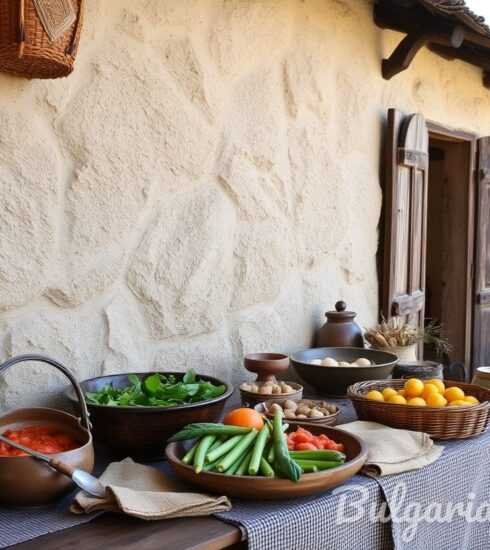Embark on a Bulgarian Culinary Tour: A Journey from Historical Eats to Modern Treats
Bulgaria, a land steeped in history and rich in culinary traditions, presents a fascinating journey of flavors that reflects its geographical diversity and historical layers. From the robust dishes forged in the mountains to the vibrant influences from Byzantine, Ottoman, and Slavic traditions, the culinary scene of Bulgaria is both diverse and profoundly rich. In this culinary guide, we explore the journey “Feasting Through Time: Savoring Bulgaria’s Historical Eats and Modern Treats,” diving deep into traditional dishes that have stood the test of time and showcasing the inventive playfulness of contemporary Bulgarian cuisine.
The Foundations of Bulgarian Cuisine
Bulgarian cuisine is a representative of the cuisine of Southeastern Europe with its variety, flavors, and substantial ingredients. It offers a distinctive blend of simple yet hearty dishes, characterized by fresh vegetables, dairy products, and a variety of meats. The Bulgarian geographic region, climate, and rich soil contribute to the abundance of produce used in the country’s culinary practices, making it a vibrant hub for gastronomists.
Essential Ingredients in Bulgarian Cooking
At the heart of Bulgarian kitchen lies:
- Yogurt – Bulgaria is famed for its rich, creamy yogurt, which contains a unique bacteria strain known as Lactobacillus bulgaricus.
- Cheese – From the salty, crumbly sirene to the softer, more elastic kashkaval, cheese is a staple in many dishes.
- Vegetables – Peppers, tomatoes, cucumbers, and onions are foundational to many Bulgarian recipes.
- Herbs and Spices – Some of the most commonly used seasonings include red pepper, paprika, and fresh herbs like dill, parsley, and mint.

Classic Dishes of Bulgaria
The country’s culinary repertoire includes an array of traditional dishes:
- Banitsa – This savory pastry, filled with sirene cheese and eggs, can be enjoyed in various versions across the country.
- Shopska Salad – A refreshing mixture of tomatoes, cucumbers, onions, peppers topped with grated sirene cheese.
- Kavarma – A traditional meat stew combining pork, chicken, or veal with mushrooms, onions, wine, and herbs.
- Lyutenitsa – A beloved thick spread made from ground roasted peppers, tomatoes, and garlic.
Discovering these classic recipes reveals much about Bulgaria’s history and regional distinctions. This journey into Bulgaria’s culinary traditions is not merely about food but also about the stories and histories intertwined with these dishes. For a deeper dive into specific Bulgarian delicacies, check out this detailed guide which explores additional treats.
The Influence of History on Bulgarian Culinary Practices

Bulgaria’s position as a crossroad between East and West has profoundly influenced its cuisine through the centuries. Each era brought with it new flavors and cooking practices that have been woven into the fabric of Bulgarian culinary traditions.
Thracian Roots
The ancient Thracians, known for their skills in farming and wine production, left behind the legacy of viticulture which Bulgaria proudly continues today. They introduced a variety of local herbs and plants into cooking, which are still prominent in Bulgarian cuisine.
Byzantine and Ottoman Contributions
During the Byzantine and Ottoman periods, the introduction of spices like cumin, cinnamon, and bay leaves added new dimensions to Bulgarian culinary practices. Dishes like moussaka and baklava entered the Bulgarian kitchen during these times, highlighting the flow of cultural influence.
Modern Influences

In contemporary times, Bulgarian cuisine has embraced influences from its neighbors and beyond, integrating modern culinary techniques and trends while maintaining its traditional roots. This blend of old and new creates a dynamic culinary landscape. For instance, the recent trend of farm-to-table dining has taken root in Bulgaria’s food scene, marrying well with the country’s long-standing tradition of using fresh, local ingredients. More on current trends can be found in a related article here.
Regional Varieties and Specialty Dishes
Bulgaria’s diverse terrain results in distinct regional culinary practices that showcase local ingredients and traditions. From the mountains to the seas, the local dishes offer a sense of place and history.
Mountainous Regions
In the elevations of the Balkan Mountains, dishes are typically hearty and spicy, often featuring slow-cooked meats and fresh cheeses. A specialty to look out for is Smilyan Beans, grown exclusively in the Smilyan region and used in rich, comforting stews.
The Black Sea Coast
Along the Black Sea coast, cuisine features a variety of fish and seafood dishes, with Bulgarian salad (shopska salad) and fried sprat being particularly popular. The use of herbs and green vegetables reflects the coastal palate’s lighter, fresher tastes.

Feasting Through Modern Treats
While traditional Bulgarian cuisine offers a window into the country’s rich past, contemporary Bulgarian gastronomy showcases a forward-looking, innovative spirit. Young Bulgarian chefs are redefining national dishes by experimenting with new cooking methods and unexpected combinations while respecting the heritage ingredients.
Contemporary Bulgarian Restaurants
Notable modern Bulgarian restaurants such as Made in Home and Raketa Rakia Bar in Sofia are at the forefront of the culinary innovation scene, offering menus that reinterpret old classics for a modern palate. These eateries not only highlight the creativity within Bulgarian cuisine but also its potential to surprise and engage the global food community.
Conclusion
“Feasting Through Time: Savoring Bulgaria’s Historical Eats and Modern Treats” illuminates the depth and breadth of Bulgarian cuisine, from its ancient roots to contemporary innovations. This culinary exploration not only offers delicious foods but also the stories of the people who make and enjoy them. Whether you are tucking into a traditional Banitsa or sampling the latest fusion flavor, Bulgarian culinary heritage offers a rich, flavorful feast for all senses. A journey through Bulgaria’s cuisine is truly a journey through its history and a testament to its vibrant cultural tapestry.
Bulgaria beckons not just as a tourist destination but as a palate adventure that promises to be as enriching as it is tasty. So, the next time you ponder about a culinary destination, remember Bulgaria – where every meal has a story and every flavor has a history.






